Digital policies may not have played a significant role in the just-concluded national election, but the arrival of a majority Liberal government will leave many expecting “real change” on the digital front in the years ahead. My weekly technology law column (Toronto Star version, homepage version) notes that Prime Minister-designate Justin Trudeau is likely to focus on key economic promises from his platform once Parliament resumes. However, there will be several digital issues that should command attention during his first 12 months in office.
Post Tagged with: "open government"
New Year Offers Chance to Hit Reset Button on Digital Policies
A new year is traditionally the time to refresh and renew personal goals. The same is true in the digital policy realm, where despite the conclusion of lawful access, anti-counterfeiting, and anti-spam rules in 2014, many other issues in Canada remain unresolved, unaddressed, or stalled in the middle of development.
With a new year – one that will feature a federal election in which all parties will be asked to articulate their vision of Canada’s digital future – there is a chance to hit the policy reset button on issues that have lagged or veered off course.
There is no shortage of possibilities, but my weekly technology law column (Toronto Star version, homepage version) notes the following four concerns should be top of mind for policy makers and politicians:
What Open Government Hides
Treasury Board President Tony Clement unveiled the latest version of his Open Government Action Plan last month, continuing a process that has seen some important initiatives to make government data such as statistical information and mapping data publicly available in open formats free from restrictive licenses.
My weekly technology law column (Toronto Star version, homepage version) notes there is much to like about Canada’s open government efforts, which have centred on three pillars: open data, open information, and open dialogue. Given the promise of “greater transparency and accountability, increased citizen engagement, and driving innovation and economic opportunity”, few would criticize the aspirational goals of Canada’s open government efforts. Yet scratch the below the surface of new open data sets and public consultations and it becomes apparent that there is much that open government hides.
Statscan To Make All Online Data Free
Big news on the open government front where Embassy is reporting that Statistics Canada will make all of its online data free starting early next year.
Was Canada’s Open Government Delay Part of the Plan?
While some delays due to the election call were understandable, seven months of inaction led skeptics to wonder whether the entire announcement was little more than a publicity stunt. The delays are particularly discouraging given Canada’s willingness to pressure others about the value of open government. Last month, Canada became one of 46 countries to join the Open Government Partnership, which is focused on the availability of information about governmental activities, supporting civic participation, and increasing access to new technologies for openness and accountability. A letter from Foreign Minister John Baird to U.S. Secretary of State Hillary Clinton confirming Canada’s participation noted the June Speech from the Throne that reaffirmed support for open data, open information, and open dialogue.









